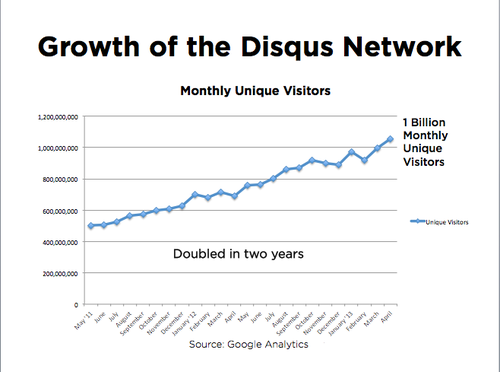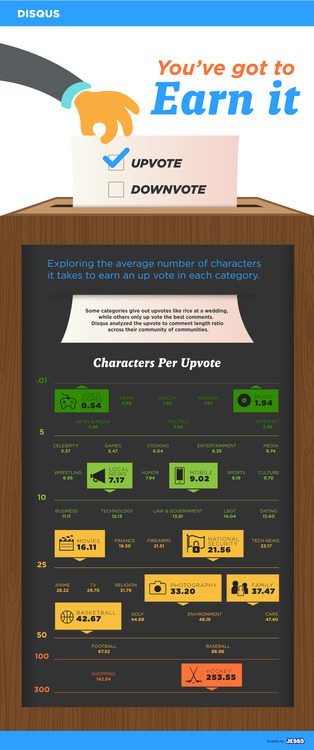Last month, Disqus achieved a significant milestone: our network hit a billion monthly unique visitors. No matter how you slice it, it puts Disqus in a select category of ubiquitous web services that millions of people use everyday.

Some other supporting data includes:
- 7 billion monthly pageviews
- 100 million user profiles
- 2.5 million site installs
- 1 million Wordpress plug-in downloads
But in and of itself, taking meaning from numbers this large is hard. And of course, Disqus isn’t a destination site so the numbers don’t lend themselves to easy comparisons. For the team at Disqus, they simply remind us that with great scale comes great responsibility. That far reaching impact is what motivates us.
To mark the occasion, we wanted to do something a little different. First, we launched a new product today called AudienceSync. See our tandem post on that here. It enables users to port their profile information to their favorite sites’ registration systems. It’s great for publishers who want to tap into the largest audience of commenters on the web.
Then we wanted to dive a little deeper into our data and look below the surface of 1 billion monthly visitors. Comments and the community dialogues they make up are poorly understood and there’s little data out there about the patterns and behaviors at work. So our data engineers did some number crunching and we’re excited to start sharing some of it.
The Majority of Comments Are Tweetable
One of the first things we were interested to learn more about was a way to classify comments themselves. The character count of comments paints a picture of natural tendencies formed by other communication mediums. One of our findings is that the majority of comments fall under 140 characters: most comments are tweetable. (Conveniently, this already a feature of Disqus. Give it a try, it’s fun.) And then there’s a long tail of comments that we’ve categorized this way:
-
Poems and Paragraphs: Statements more fully formed than can be captured in a Tweet.
-
Speeches and Soliloquies: Fully formed arguments and ideas.
-
New Posts: Readers writing their own article or full reply to the original post.

How channels like Disqus and Twitter can seamlessly pull audiences into a true discussion is something we’re continually thinking through. For publishers, identifying the hidden writing talents among their readers is another key takeaway. Readers increasingly look at comments as their chance to be in the story and as this data shows, some even want to rewrite the story.
Community Voting Habits Have Extremes
Voting on comments is an extremely popular function of Disqus. It’s a lightweight social action that keeps even those not leaving comments participating. It also serves as a crowdsourcing mechanism to surface the best comments. In this analysis, we wanted to know what it takes to earn an upvote and how that might differ according to the type of site you’re on. And again, character count told us a lot. By categorizing over 200 super active Disqus communities into 40+ categories, a wide ranging upvote-to-character ratio emerged.

What really surprised us were the extremes between fan sites. Fan sites are big users of Disqus. Fans of anything are by definition a community. They share a common passion. But in this analysis, sites dedicated to gamers and mobile fanboys showed rampant upvoting. Readers there aren’t so much having fully formed discussions as they are likely trading one-liners. Whereas sports fan sites were on the opposite end of that spectrum, with basketball sites showing an average character length per upvote of 42 and hockey a whopping 253 respectively. (It is playoff time after all. Passions are running high.)
Better understanding the breadth of community types on Disqus will be a focus of future research we do. Seeing and engaging with the galaxy of sites that use Disqus is already a reality. It’s called Gravity. Check it out if you’ve haven’t already.
Replies Are an Active Community Metric
We get asked a lot what makes a great community. There are many components to a community. But here we wanted to start to lay the foundation for tangible data that moderators and bloggers could look at to judge just how active or vibrant a community is. So we did an analysis of our most active sites and looked at one key indicator: replies. Replies to comments (and replies to replies) are a sign that community members are interacting, that they’re talking with each other. In this analysis, sites focused on music, politics and entertainment were the runaway most active winners.

You’ll see more data insights from us in the future. If there’s anything you’d like to see us examine, share a comment below. You can also learn more about Disqus data services on our website.
So What is Cooler than a Billion Monthly Uniques?
Finally, we wanted to mark this occasion by sharing a little love to you, our users. We don’t always get things right, but everyday we hear great feedback from you, our own community. That’s what’s cool to us.
So we put together a little video about you and for you. Enjoy.
